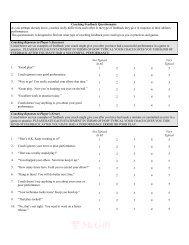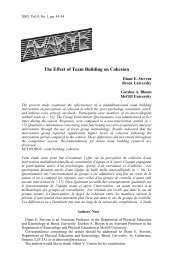International Journal of Sport Psychology
International Journal of Sport Psychology
International Journal of Sport Psychology
You also want an ePaper? Increase the reach of your titles
YUMPU automatically turns print PDFs into web optimized ePapers that Google loves.
needs <strong>of</strong> the swimmers. More research is necessary to better understand the<br />
coach’s role in providing (and the athletes’ interpretations <strong>of</strong>) emotional support.<br />
Coaches also challenged the girls’ thoughts, attitudes, and behaviors in<br />
ways that were initially deemed unhelpful but, following some cogitation,<br />
were appraised as positive supportive tactics. This ‘tough love’ approach,<br />
which included the coaches’ sarcastic, harsh, or even nonverbal feedback, is<br />
consistent with both a task and emotional challenge social support dimension<br />
(Rees et al., 2007; Richman, Rosenfeld, & Hardy, 1993). There is debate<br />
in the literature about whether challenging forms <strong>of</strong> support can be interpreted<br />
as positive, and thus operationalized as support (Rees et al., 2007).<br />
The current qualitative findings suggest challenging elite athletes’ skills and<br />
motives may be appraised initially as negative; yet these strategies were effective<br />
because they created an environment that let the swimmers realize their<br />
own athletic strengths and limitations. As such, the current study enabled a<br />
qualitative look at the ways in which coaches interacted with their elite-level<br />
athletes, and the complex process that the athletes used to interpret coaching<br />
behaviors. Nonetheless, these approaches may not be perceived as positive<br />
or supportive by less competitive athletes or those at younger developmental<br />
stages than the girls in the current study. Given the importance <strong>of</strong> athlete perceptions<br />
and interpretations <strong>of</strong> coaching behaviors (Horn, 2002), the finding<br />
<strong>of</strong> rumination that takes place following coach support tactics is not well<br />
researched and highlights the importance <strong>of</strong> understanding mechanisms<br />
involved in fostering motivation in elite sport.<br />
The coach-athlete relationship has been defined using terms such as<br />
inequality, power, and control (Burke, 2001; Tomlinson, 1997). This relationship<br />
has also been defined as a utility interaction based on the coach and<br />
athlete getting what they want and need (Drewe, 2002). Also, coach-athlete<br />
interactions have been described as a caring and nurturing experience that is<br />
much like that <strong>of</strong> a parent-child relationship (Neale & Tutko, 1975). The current<br />
findings speak to a combination <strong>of</strong> these perspectives – one that supports<br />
Jowett’s (2005) work defining this relationship as providing athletic<br />
excellence and personal growth using a range <strong>of</strong> social support functions.<br />
Taken together, elite athletes should be encouraged to harness the social support<br />
that they need from coaches.<br />
Teammates predominantly provided network support by being part <strong>of</strong> a<br />
group who had similar sport lifestyles, goals, and struggles. While few studies<br />
have focused on network support, it was clearly a specific social support<br />
function that was important to the elite athletes in our study, although there<br />
were limits to this support. The participants reported feeling a lack <strong>of</strong> net-<br />
354




